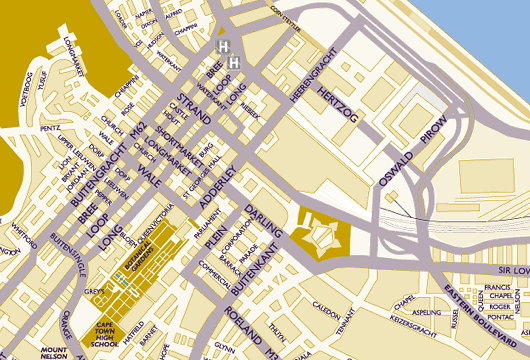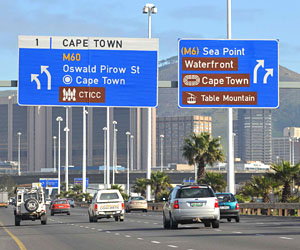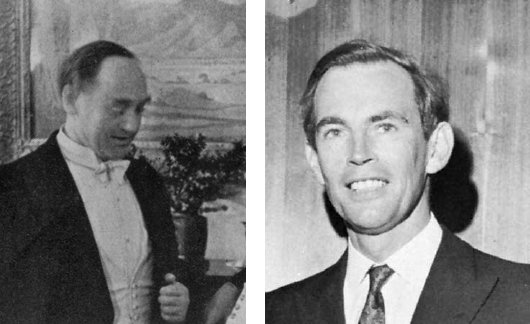
About Andrew Cusack
 Writer, web designer, etc.; born in New York; educated in Argentina, Scotland, and South Africa; now based in London.
Writer, web designer, etc.; born in New York; educated in Argentina, Scotland, and South Africa; now based in London. read more
News
Blogs
Reviews & Periodicals
Arts & Design
World
France
Mitteleuropa
Knickerbockers
Argentina
The Levant
Africa
Cape of Good Hope
Netherlands
Scandinavia
Québec
India
Muscovy
Germany
Academica

Cape Town’s ‘Nazi’ Street to be Renamed
Oswald Pirow Street will rechristened after Dr. Christiaan Barnard
The city of Cape Town has recently effected a small number of street name changes decided at the end of last year. The N2 route as it heads into the centre of the city, currently called Eastern Boulevard, will be renamed Nelson Mandela Boulevard. The open square between the opera house and the city offices will be renamed Albert Luthuli Place. Most significantly, Oswald Pirow Street on the Cape Town foreshore will be renamed Christiaan Barnard Street.
city of Cape Town has recently effected a small number of street name changes decided at the end of last year. The N2 route as it heads into the centre of the city, currently called Eastern Boulevard, will be renamed Nelson Mandela Boulevard. The open square between the opera house and the city offices will be renamed Albert Luthuli Place. Most significantly, Oswald Pirow Street on the Cape Town foreshore will be renamed Christiaan Barnard Street.
The renaming of streets and other places in South Africa has proved a controversial and unsettling task. Many streets named after leading figures associated with the 1948-1990 apartheid regime remain. In 2001, the New National Party (NNP) mayor of Cape Town, Peter Marais, attempted to rename Adderley Street and Wale Street after Nelson Mandela and F.W. de Klerk respectively. But Marais’s plan provoked a surprising public backlash, as well as opposition-for-opposition’s sake from the local ANC. The proposed ‘Nelson Mandela Avenue’ had already been renamed once: originally Heerengracht, the grateful citizens of Cape Town rechristened it Adderley Street in 1850, as a token of thanks to Charles Bowyer Adderley MP (later 1st Baron Norton) for his successful campaign against turning the Cape into a penal colony.
Normally, I disapprove of renaming. Names that are truly controversial or offensive are usually dispensed with at the earliest possible opportunity. I’m sure everything named after Hitler instantly reverted to former names at the fall of the Third Reich, and we all recall the cheering crowds dismantling statues of Lenin, Stalin, and Dzerzhinsky. Renaming streets which bear the names of apartheid-era government ministers instead gives the impression of attempting to wipe memory clean. It is an attempt to rewrite history. The very fact that these names have survived so long under ‘the new dispensation’ shows that they are relatively uncontroversial. No one is repulsed by the sight of them, nor does anyone go around hacking down the street signs.
However, I think we can make an exception in the case of Oswald Pirow Street. Pirow was among the nastiest of nasties. He had been a pioneering government minister who promoted aviation and founded South African Airways. But Pirow, who met Hitler in 1933, became an overt Nazi sympathiser and was convinced that a European war was coming and that a German victory was certain. Pirow became such a fan of the Nazis that his family only spoke German at home, and his daughter Else told the Daily Express that they felt more German than South African.
In September 1940, he launched his Nuwe Orde (‘New Order’) group, which advocated the establishment of a Nazi-style dictatorship in South Africa. The group was eventually expelled from the National Party when Malan and Strijdom openly condemned Hitler and his philosophy. With the Nuwe Orde candidates all defeated in the 1943 wartime general election, Pirow laid low for the rest of the war. A King’s Counsel, Pirow acted as prosecutor during the 1956 Treason Trial, and Mandela is said to have developed a certain admiration for Pirow thanks to his politeness towards the accused.

Dr Christiaan Barnard (above, right), the famous surgeon who completed the world’s first successful heart transplant, seems an entirely suitable and commendable replacement for Oswald Pirow (above, left). In fact, I’m surprised he doesn’t have a street in the city named after him already, but that’s probably because a major hospital bears his name.
Chief Luthuli, meanwhile, was basically a good egg if sometimes misguided. He was the last moderate leader of the African National Congress and was awarded the Nobel Peace Prize for his consistent refutation of political violence. The ANC was later hijacked by the more extreme and violent wing, and commenced the ‘armed struggle’ against the government which lead to the deaths of so many people as well as the destruction of the ANC’s ostensible moral supremacy (something almost completely ignored by anti-apartheid activists outside South Africa).
Search
Instagram: @andcusack
Click here for my Instagram photos.Most Recent Posts
- Patrick in Parliament March 18, 2024
- Articles of Note: 13 March 2024 March 13, 2024
- Cambridge March 9, 2024
- Taken on Trust March 4, 2024
- Immanuel on the Green March 2, 2024
Most Recent Comments
Book Wishlist
Monthly Archives
Categories



Yes, Pirow was as nasty a piece of work as you could find among the worst of the old Nats, and I agree with you that the absence of his name in Cape Town, or anywhere else in South Africa, is an improvement. Unfortunately, one brute’s name is often replaced by other brute’s name in SA. Take old Moore Road in Durban for example. It has recently been re-named after that impish mass murderer, “Che” Guevara. Moore, a colonial era Natal Prime Minister at least was South African and was not known for his enthusiastic love of killing people. What the inept failure Guevara did to be honoured like this by the uThekwini Municipality remains a mystery, though we do know that he had a central African connection. He blundered about in the Congo in the 1960’s trying unsuccessfully to foment revolution there. As a result of his frustrations in that maimed part of the continent he developed a deep racist contempt for African people as his own writings attest. This further compounds the mystery of why the ANC-led municipality would honour that grisly thug by re-naming a major Durban street after him.
It seems Mr Pirow’s good name is being tarnished here for being a staunch Afrikaner nationalist and anti-communist. That many Boers were sceptical of Churchill and sympathetic to the Germans should not be surprising. This is especially true during the early stages of the war when the moral dimension was less starkly drawn. The fact that Pirow was involved in a grim struggle for the very survivial of his own volk has in my opinion been adequately borne out.
The idea that the far right (HNP) were somehow ‘worse’ than the middle right (NP), is a hard case to make. South Africa’s history is what it is. To turn this around, what possible good could a more verligte NP, or a United Party victory in the 1948 election, have done? Rhodesia was South Africa without the Afrikaner nationalists.